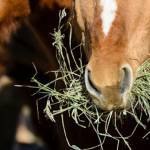Iodine: Essential Trace Mineral for Horses

The requirement for iodine in equine diets is not exactly a hot topic of conversation for most horse owners, but the relative obscurity of this trace mineral does not mean that it is unimportant. Iodine’s one known function is as a vital part of the thyroid hormones thyroxin and triiodothyronine.
Thyroxin and the tissue active form of the hormone, triiodothyronine (T3), serve a multitude of metabolic and regulatory roles. The thyroid hormones affect all of the organ systems, muscle metabolism, the nervous system, respiration, and the cardiovascular system. Thyroxin also controls growth rate, cell division, metabolic rate, and oxidative metabolism. In the athletic horse, perhaps the most important role of thyroxin is control of basal metabolic rate and cellular energy metabolism. Thyroid hormone stimulates respiration in the mitochondria resulting in increased oxygen consumption and energy production.
There has been some interest in the use of supplemental, synthetic thyroxin in the performance horse. Some horses may have low blood thyroid hormone concentrations, but this does not necessarily mean that the horse is hypothyroid. Many commonly used drugs affect thyroid hormone concentration and the best test to assess thyroid function (thyroid stimulation test) is not readily available. It has not been determined whether this apparent lack of thyroactive hormones is due to a lack of iodine in the diet, a lack of selenium for the conversion of T4 to T3, or dysfunction of the thyroid gland. Additionally, it is known that some foods include compounds that interfere with iodine uptake and thyroid function. Kale and cabbage are on the list of suspect foods for humans, and there is some evidence that Kentucky 31 tall fescue may be on the equine feedstuffs list. Because many horses graze fescue pastures with no obvious ill effects, it is likely that this forage does not pose a threat to horses that consume average amounts of tall fescue.
Forages derive minerals including iodine from the soil, with sandy soils tending to be lower in iodine than clay soils. Iodine in acid soils appears to be more readily available to plants than the iodine in alkaline soils. Virtually all states in the eastern half of the U.S. have soils with adequate levels of iodine, while some northern and western states have areas of iodine-deficient soils. Fortified horse feed products contain sufficient iodine to meet the needs of all classes of horses.








